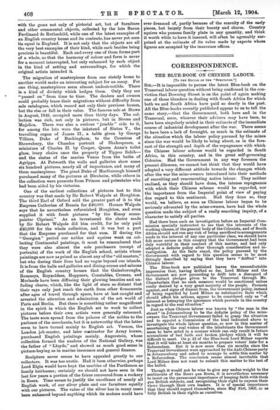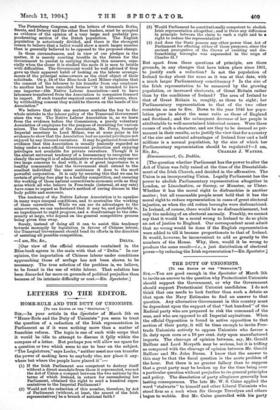CORRESPONDENCE.
THE BLUE-BOOK ON CHINESE LABOUR. [To THE EDITOR OP THE " SPECTATOR.1
SIR,—It is impossible to peruse the latest Blue-book on the Transvaal labour question without being confirmed in the con- viction that Downing Street is on the point of again making one of those blunders in dealing with South Africa for which both we and South Africa have paid so dearly in the past. All the Blue-books recently published appear to us to tell the same story,—that the Government, both here and in the Transvaal, seem, whoever their advisers may have been, to have been singularly misled in their estimate of the immediate course of industrial development after the war. There seems to have been a lack of foresight, as much in the estimate of the situation which the labour policy pursued by the mines since the war would be likely to bring about, as in the fore- cast of the strength and depth of the repugnance with which the Chinese labour scheme would be regarded in South Africa, in this country, and in the great self-governing Colonies. Had the Government in any way foreseen the present dilemma, we cannot but think that they would have adopted a very different attitude towards the changes which after the war the mine-owners introduced into their methods of recruiting and remunerating native labour. They neither realised, as they should have done, the intense repugnance with which their Chinese scheme would be regarded, nor the importance from the Imperial point of view of paying due regard to this sentiment. Had they done so, they would, we believe, as soon as Chinese labour began to be aeriously advocated by the mine-owners, have had the whole question made the subject of a really searching inquiry, of a character to satisfy all parties.
Had there been such an investigation before an Imperial Com- mission specially instructed to see that the interests of the working classes, of the general body of the Colonists, and of South Africa should not run any risk of being sacrificed to arrangements made in the interest of any One particular class, we should have felt more secure in this country that the Government had been duly watchful in their conduct of this matter, and had only adopted a definite policy after thorough consideration and in- vestigation. As the facts stand, the policy pursued by the Government with regard to this question seems to be most fittingly described by saying that they have "drifted" into Chinese labour.
The Blue-book now published leaves the uncomfortable impression that, having drifted so far, Lord Milner and the Government are now proceeding to drift into a disregard of the distinct pledges given to the Transvaal through Mr. Chamberlain that no such measure would be sanctioned unless really desired by a very great majority of the people. Protests against, and signs of dissent from, the Government policy, instead of being regarded by Lord Milner as substantive facts which should affect his actions, appear to be considered only as "of interest as betraying the ignorance which prevails in the country in regard to the real situation."
Just as when Chinese labour was known by "the man in the street" in Johannesburg to be the definite policy of the mine- owners the Transvaal Government failed to grasp the situation and to appoint a Commission of the kind indicated above to investigate the whole labour question, so now in this matter of ascertaining the real wishes of the inhabitants the Government seem to have acted in a manner which can only result in future accusations of bad faith and broken pledges which it will be difficult to meet. On p. 22 of the Blue-book Lord Milner reports that it will take at least six months to prepare voters' lists. for a Referendum. But it is now more than six months since the Transvaal Governinent were approached by the Anti-Chinese party in Johannesburg and asked to arrange to settle this matter by a Referendum. The conclusion seems almost inevitable that Lord Milner does not want to submit this matter to the test of the ballot.
Though it would not be wise to give any undue weight to the sentiments of the Boers qua Boers, it is nevertheless necessary to insist on the paramount importance of keeping faith with them qua British subjects, and recognising their right to express their views through their own leaders. It is of special importance that they should regard themselves, since May 31st, 1902, as as fully British in their rights as ourselves.
The Pietersburg Congress, and the letters of Generals Botha, Smuts, and Delarey and the other Boer leaders, must be accepted as evidence of the opinion of a very large and probably pre- ponderating section of the Dutch population. The English population is notoriously divided, and there is the strongest reason to believe that a ballot would show a much larger number than is generally believed to be opposed to the proposed change.
In these circumstances, and in view of our pledges in the matter, it is merely courting trouble in the future for the Government to persist in carrying through this measure, espe- cially when the closer it is studied the more it is seen to bristle with difficulties. The Government would be well advised if they gave up their apparent habit of looking on the labour arrange- ments of the principal mine-owners as the chief object of their solicitude. On p. 24 of the Blue-book Lord Milner explains that the consent of the labourer to his transfer from one employer to another had been cancelled because "it is intended to have one importer—the Native Labour Association—and to have labourers transferred from the Association to companies licensed to import. If such transfer required consent of labourers, then by withholding consent they would be thrown on the hands of the Association."
We believe that this one sentence contains the key to the whole mistake in the labour policy of the Transvaal Government since the war. The Native Labour Association is, as we learn from the evidence before the Commission, a purely voluntary Association of employers for the purpose of recruiting for various mines. The Chairman of the Association, Mr. Perry, formerly Imperial secretary to Lord Milner, was at some pains in his evidence to show that the Association had no special privileges not enjoyed by any licensed recruiters. It may be gathered from other evidence that this Association is usually jealously regarded as being under a semi-official Government protection and enjoying privileges not available for private recruiters. Though it is the almost universal tendency of a bureaucracy to recognise too clearly the saving it is of administrative worries to have only one or two large concerns to deal with, it is of great importance to a healthy community that the Government shall extend to the smallest individual the same assistance it does to the most powerful corporation. It is only by securing this that we can be certain of giving free play to a healthy competition, and ensuring the working of those natural correctives to economic evils as they arise which all who believe in Free-trade (internal, at any rate) have come to regard as Nature's method of curing disease in the body politic and economic.
The tendency of the Native Labour Association is to equalise in many ways unequal conditions, and to neutralise the working of these correctives. While we can see its advantages to the mine-owners, we can understand that it may be, and probably is, an impediment to rapid progress, and a disadvantage to the com- munity at large, who depend on the general competitive process being given free sway.
Surely, instead of doing all it can to assist this tendency towards monopoly by legislation in favour of Chinese labour, the Transvaal Government should bend its efforts in the direction of assisting all possible competition.
[Our view of the official statements contained in the Blue-book agrees in the main with that of "Delta." In our opinion, the importation of Chinese labour under conditions approaching those of serfage has not been shown to be necessary. The true solution of the problem is, we believe, to be found in the use of white labour. That solution has been discarded far more on grounds of political prejudice than because of its intrinsic difficulty or cost.—En. Spectator.]











































 Previous page
Previous page